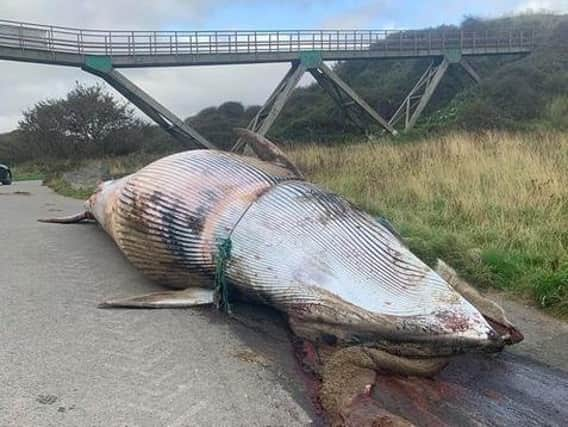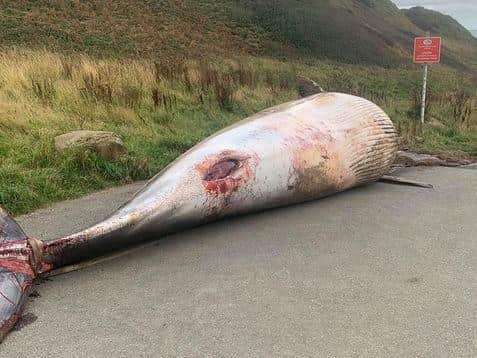Carcass of 'garotted' minke whale is removed from beach near Whitby for autopsy


The minke whale - one of three found dead in similar circumstances near Whitby last week - washed up at Upgang Beach on Friday night.
Local building firm Nobles used a JCB and other plant machinery to drag the carcass up to Upgang Ravine, where it was left on the road to await collection by marine scientists who will conduct an autopsy.
Advertisement
Hide AdAdvertisement
Hide AdLocal resident Luke Faichney witnessed the operation, which was done to prevent vessels striking the body had it remained in the water. At one point, the mammal's stomach began to detach itself from the decomposing carcass on the sands.
Clear injuries to the whale can be seen and Mr Faichney described it as having been 'garotted' by fishing wire which was still visible.
Photographs taken the next day by Tom Spark show the body by the roadside with traces of blood from its wounds still present.
There are deep gashes in the whale's flesh that suggest it became entangled in tackle such as a lobster pot chain and drowned while trying to free itself.
Advertisement
Hide AdAdvertisement
Hide AdA dead juvenile minke whale was seen with fishing wire wrapped around its body by a Whitby Whale Watching cruise on Tuesday, and two more corpses were spotted near Staithes and Sandsend later in the week, both with injuries consistent with either boat collision or entanglement. One was later seen near Whitby Pier, although it is not clear which of the three washed ashore at Upgang.


In the UK, around 100-150 dead cetaceans are subject to post-mortem investigations each year. The Cetacean Strandings Investigation Programme is responsbile for these autopsies, some of which are conducted in situ if the animal is too large to be transported back to their laboratory at the Institute of Zoology in London. Although the figure is only a small proportion of the whales and dolphins which wash up on British shores each year, many are in too advanced a state of decomposition to attempt a safe or effective post-mortem.